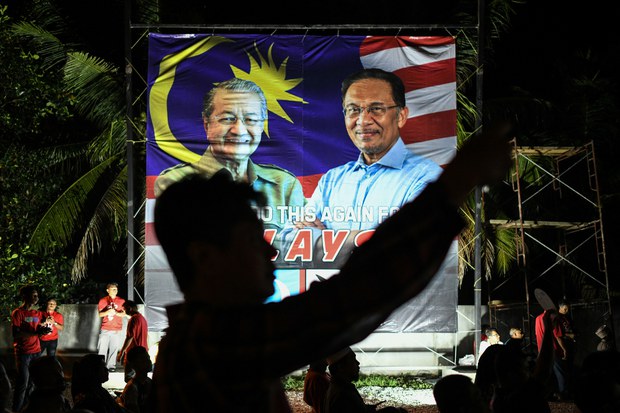Malaysia’s Election Commission Bars Human Rights Body from Monitoring Polls
2018.04.26
Kuala Lumpur
 A supporter takes pictures in front of a banner showing former Malaysian Prime Minister Mahathir Mohamad (left) and jailed de facto opposition leader Anwar Ibrahim during a campaign rally on Langkawi island, April 15, 2018.
A supporter takes pictures in front of a banner showing former Malaysian Prime Minister Mahathir Mohamad (left) and jailed de facto opposition leader Anwar Ibrahim during a campaign rally on Langkawi island, April 15, 2018.
Malaysia’s human rights commission (Suhakam) vowed Thursday to press ahead with its plans to monitor nationwide voting May 9, after it announced that the country’s election officials had turned down its application seeking accreditation for observing the polls.
Suhakam chairman Razali Ismail said it would deploy about 50 of its officials and volunteers in areas where parliamentary seats would be hotly contested in next month’s general election – such as in Kuala Lumpur and Selangor and Kelantan states – although the Election Commission (EC) had denied its application for accreditation.
“We will, in the public interest, proceed with our monitoring plans,” Razali said in a statement, without elaborating.
“Suhakam cannot comprehend this decision,” Razali said, adding that the panel considers itself a vehicle of integrity with a legislated mandate to protect and promote human rights in Malaysia.
The rejection means Suhakam representatives will not be allowed to enter polling stations. EC officials did not respond to BenarNews queries seeking confirmation on this development.
Suhakam’s announcement came two days after the Election Commission issued new campaigning rules for the upcoming vote that exclude the opposition from using photos of its two most recognizable leaders – former Prime Minister Mahathir Mohamad and jailed People’s Justice Party (PKR) founder Anwar Ibrahim – on campaign posters and banners in most of the country.
The Election Commission also came under fire from the opposition late last month after parliament passed a bill to redraw the nation’s electoral maps, as recommended by the EC. The opposition said the changes to the electoral boundaries would favor the ruling bloc in Malaysia’s 14th general election.
Formal campaigning kicks off on Saturday with political parties and coalitions vying for 222 parliamentary seats and 12 state assemblies. Almost 15 million Malaysians are registered to vote.
Eric See To, deputy director of strategic communications for Barisan Nasional (BN), Malaysia’s ruling coalition, said the EC should have approved Suhakam’s application.
“I think they should be granted, unless they were never granted before or if other NGO groups have already been granted,” he told BenarNews in a text message.
New rules
On Tuesday, the EC issued new guidelines stipulating that only the images of party presidents and deputy presidents, or their equivalents, could be used on campaign materials, except for the photo of the candidate in his or her particular constituency.
The new guidelines means that the image of Prime Minister Najib Razak, who heads the United Malays National Organization, can appear on campaign materials, but not those of the opposition’s two biggest leaders, Mahathir and Anwar.
Mahathir, the opposition’s choice for prime minister should it win the election, heads the Bersatu party. But Malaysia’s Registrar of Societies (RoS) earlier this month de-registered Bersatu as a party.
Bersatu and other partners in the Pakatan Harapan coalition – whose application for registration was rejected by RoS – later announced that they would contest the election under the logo and banner of Anwar’s party, PKR.
But the incarcerated Anwar does not currently hold the party’s position of president or deputy president.
On Wednesday, Bersih 2.0, a grassroots Malaysian clean government and elections watchdog, questioned the necessity and rationale behind the new campaigning guidelines, saying there were bigger issues for the EC to resolve.
“In view of the other larger electoral issues that require the immediate attention of the Election Commission, it is surprising that the EC chose to focus on regulating campaign materials of political parties,” it said. “Why are these additional regulations suddenly needed now?
![180425-MY-SPR-Gambar-INSIDE620.jpg Barisan Nasional chairman Najib Razak holds a copy of his party’s campaign manifesto in Kuala Lumpur, April 7, 2018. [S.Mahfuz/BenarNews]](/english/news/malaysian/malaysia-politics-04262018170015.html/180425-MY-SPR-Gambar-INSIDE620.jpg/@@images/fbc4952f-ef1f-42fd-bcc3-f9a476275173.jpeg)
Najib predicts ‘better result’
Meanwhile, in an interview with Bloomberg News on Wednesday, Prime Minister Najib predicted a “better result” in this year’s election campaign, saying his political rival and former mentor in 92-year-old Mahathir would be a “hard-sell” for voters.
In 2013, the BN coalition lost the popular vote for the first time since the country gained independence in 1957. But BN won a slim majority of parliamentary seats.
Najib said he was not predicting “a huge majority” but that his party was “reasonably sanguine” about possible results.
“We are reasonably confident of a good result,” Najib, 64, told Bloomberg. “There is no movement for changing the government. I don’t see that.”







